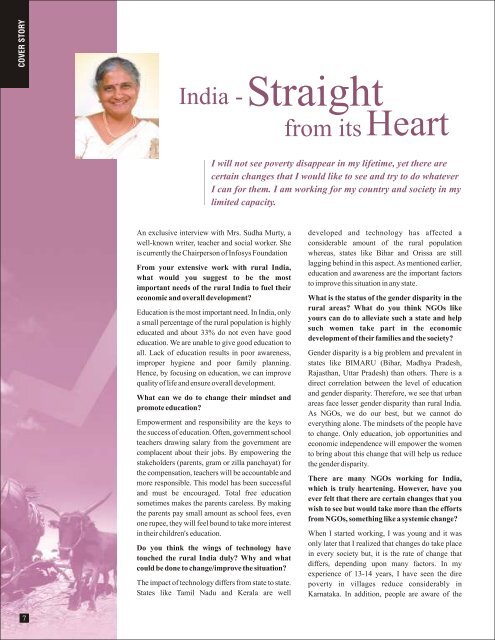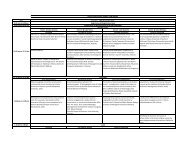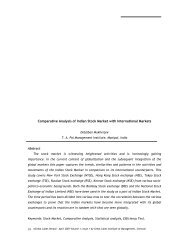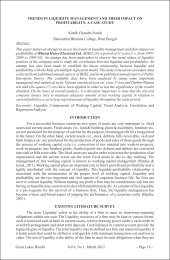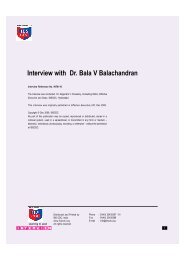Gravity Magazine_Final - Great Lakes
Gravity Magazine_Final - Great Lakes
Gravity Magazine_Final - Great Lakes
Create successful ePaper yourself
Turn your PDF publications into a flip-book with our unique Google optimized e-Paper software.
COVER STORY<br />
7<br />
India -<br />
An exclusive interview with Mrs. Sudha Murty, a<br />
well-known writer, teacher and social worker. She<br />
is currently the Chairperson of Infosys Foundation<br />
From your extensive work with rural India,<br />
what would you suggest to be the most<br />
important needs of the rural India to fuel their<br />
economic and overall development?<br />
Education is the most important need. In India, only<br />
a small percentage of the rural population is highly<br />
educated and about 33% do not even have good<br />
education. We are unable to give good education to<br />
all. Lack of education results in poor awareness,<br />
improper hygiene and poor family planning.<br />
Hence, by focusing on education, we can improve<br />
quality of life and ensure overall development.<br />
What can we do to change their mindset and<br />
promote education?<br />
Empowerment and responsibility are the keys to<br />
the success of education. Often, government school<br />
teachers drawing salary from the government are<br />
complacent about their jobs. By empowering the<br />
stakeholders (parents, gram or zilla panchayat) for<br />
the compensation, teachers will be accountable and<br />
more responsible. This model has been successful<br />
and must be encouraged. Total free education<br />
sometimes makes the parents careless. By making<br />
the parents pay small amount as school fees, even<br />
one rupee, they will feel bound to take more interest<br />
in their children's education.<br />
Do you think the wings of technology have<br />
touched the rural India duly? Why and what<br />
could be done to change/improve the situation?<br />
The impact of technology differs from state to state.<br />
States like Tamil Nadu and Kerala are well<br />
Straight<br />
from its<br />
Heart<br />
I will not see poverty disappear in my lifetime, yet there are<br />
certain changes that I would like to see and try to do whatever<br />
I can for them. I am working for my country and society in my<br />
limited capacity.<br />
developed and technology has affected a<br />
considerable amount of the rural population<br />
whereas, states like Bihar and Orissa are still<br />
lagging behind in this aspect. As mentioned earlier,<br />
education and awareness are the important factors<br />
to improve this situation in any state.<br />
What is the status of the gender disparity in the<br />
rural areas? What do you think NGOs like<br />
yours can do to alleviate such a state and help<br />
such women take part in the economic<br />
development of their families and the society?<br />
Gender disparity is a big problem and prevalent in<br />
states like BIMARU (Bihar, Madhya Pradesh,<br />
Rajasthan, Uttar Pradesh) than others. There is a<br />
direct correlation between the level of education<br />
and gender disparity. Therefore, we see that urban<br />
areas face lesser gender disparity than rural India.<br />
As NGOs, we do our best, but we cannot do<br />
everything alone. The mindsets of the people have<br />
to change. Only education, job opportunities and<br />
economic independence will empower the women<br />
to bring about this change that will help us reduce<br />
the gender disparity.<br />
There are many NGOs working for India,<br />
which is truly heartening. However, have you<br />
ever felt that there are certain changes that you<br />
wish to see but would take more than the efforts<br />
from NGOs, something like a systemic change?<br />
When I started working, I was young and it was<br />
only later that I realized that changes do take place<br />
in every society but, it is the rate of change that<br />
differs, depending upon many factors. In my<br />
experience of 13-14 years, I have seen the dire<br />
poverty in villages reduce considerably in<br />
Karnataka. In addition, people are aware of the


